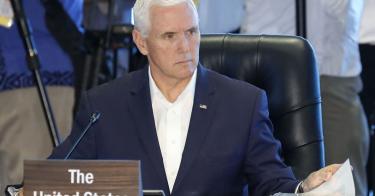On his travels through Southeast Asia last week, Vice President Mike Pence talked about the U.S. commitment to the Indo-Pacific region and a U.S. strategy that rests on the pillars of prosperity, security and sovereignty.
What inspired his remarks were China’s questionable trade and investment practices, its military expansion, and its exercise of economic and diplomatic leverage. Few in the Asia-Pacific region know more about these practices than Taiwan — a constant target of Beijing’s machinations.
Mr. Pence’s remarks show an administration that not only wants to counter Chinese influence in the region but supports those who share the same values as America. And Taiwan has long been a beacon for economic growth and economic freedom in the region.
Strengthening the U.S.-Taiwan economic partnership should be a part of the administration’s Indo-Pacific strategy.
Like most countries in the region, Taiwan has become more economically dependent on China over the last 20 years. The U.S. used to be Taiwan’s largest trading partner; now, Taipei’s trade with China is double that with the U.S. and is almost a quarter of its total amount.
Today, Beijing relies on a variety of measures to increase Taiwan’s economic dependence, gain influence in Taipei, and secure new technology. China’s central and provincial governments have new initiatives that give social incentives and encourage investment from Taiwan into China — easing the transfer of resources from Taiwan into China.
Meanwhile, Beijing’s international influence has limited Taiwan’s ability to secure more advantageous economic relationships elsewhere. Few countries have taken the initiative to sign bilateral deals with Taiwan, despite the lure of the island’s economic strength. Last month, Australia bowed to pressure from Beijing and became the latest country to back away from a bilateral trade agreement with Taiwan.
Even countries that are a part of the new Trans-Pacific Partnership (TPP), a trade deal many saw as a means to offset countries like China’s heavy government influence, are hesitant to support Taiwan joining the trading bloc over fear of Chinese retaliation. Meanwhile, trade and investment for those outside of TPP becomes relatively more expensive.
Even the U.S. has allowed its official economic relationship with Taiwan to fall neglected. For years, the U.S. and Taiwanheld high-level talks as part of the U.S.-Taiwan Trade and Investment Framework Agreement (TIFA). However, the two sides have yet to meet since President Trump took office.
Recently, in its annual report to Congress, the U.S.-China Economic and Security Review Commission recommended restarting those high-level talks next year. That’s would be a good and significant step, but the TIFA talks often get hampered by bureaucracy and politics. The U.S.-Taiwan economic relationship needs a bigger push.
The White House should establish a new high-level economic dialogue with Taiwan. With an American team led by both the U.S. trade representative and the secretary of commerce, the new dialogue could effectively resolve previous trading issues and explore new areas of cooperation.
The dialogue would build on a framework similar to that used in the high-level dialogue between the U.S. and Japan. It would focus on a strategy for: hammering out trade and investment rules and addressing disputes; cooperating on economic and structural policies; and exploring new opportunities, like promoting the digital economy. And it would be a way to show investors — and other nations — that the U.S. supports and values economic engagement with Taiwan.
From an economist’s point of view, China’s influence in the Asia-Pacific is worrisome because of how it distorts markets. A free and open Indo-Pacific region means allowing the free market to prosper — letting individuals engage in economic activity removed from government interference. Right now, Taiwan is having trouble tapping into the free market because of the influence China wields. It’s time for the U.S. do a little counterweighting and support this neglected partner in Asia.
This piece originally appeared in The Washington Times



